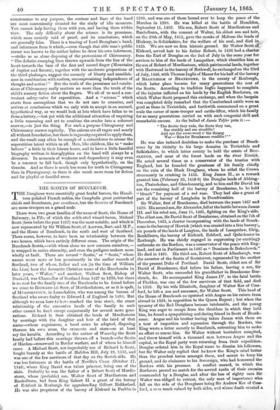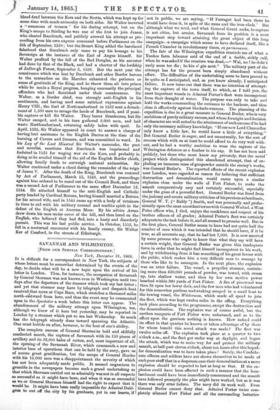THE SCOTTS OF BUCCLEUCH.
THE Douglases were essentially great feudal barons, the Hamil- tons polished French nobles, the Campbells great patriarchal chiefs and Scotehmen, par excellence, but the SCOTTS of Bucclench are moss-troopers on a grand scale.
There were two great families of the name of Scott, the House of Balweary, in Fife, of which the celebrated wizard-baron, Michael Scott (born before the year 1217) was the most notable, and which is now represented by Sir William Scott, of Ancrum, Bart. and M.P., and the House of Buccleuch, in the south and west of Scotland. There seems, however, to have been no relationship between the two houses, which have entirely different arms. The origin of the Buccleuch Scotts,—with whom alone we now concern ourselves, — is wrapped in entire obscurity, and even the pedigree-makers seem wholly at fault. There are several "Scotts," or "Scots," whose names occur more or less prominently in the earlier records of Scotland, two of whom, father and son (in the time of William the Lion) bear the favourite Christian name of the Buccleuchs in later years, "Wolter," and another, Wallten Scot, Bishop of Dunkeld, was Chancellor of Scotland from 1227 to 1238, but there is no root for the family tree of the Buccleuchs to be found before we come to Rictus]) LE Scor, of Murthockstoun, or as it is spelt, of MIIRDIESTOUN, in Lanarkshire, who was among the barons of Scotland who swore fealty to Edward I. of England in 1296. But although we seem here to hava reached the true stock, the exact relationship of the successive heads of the family to each other cannot be fixed except conjecturally for several more gene- rations. Richard le Scot obtained the lands of Murdiestoun by marriage with the daughter and heir of the laird of that name—whose cognizance, a bend azure he adopted, disposing thereon his owa arms, the crescents and stars—so at least say the heralds. According to the author of Waver/ey the Scott family had before this marriage thrown off a branch—the Scotts of Harden—renowned in Border warfare, and of whom he himself came. A Michael Scott, not improbably son of Richard le Scott, fought bravely at the battle of Hendon Hill, July 19, 1333, and was one of the few survivors of that day on the Scotch side. He was less fortunate at the battle of Neville's Cross (October 17, 1346), where King David was taken prisoner, being one of the slain. Probably he was the father of a Robert Scott of Murdie- stoun, whose (probable) son, Walter Scott of Mardiestoun and Rankelburn, had from King Robert II. a grant of the barony of Eckford in Roxburgh for apprehending Gilbert Ridderford. He was also proprietor of the barony of Kirkurd in Peebles in 1389, and was one of those bound over to keep the peace of the Marches in 1398. He was killed at the battle of Homildon, September 11, 1402. His son, Robert Scott of Murcliestoun and Rankelburn, with the consent of Wolter, his eldest son and heir, on the 28th of May, 1415, gave the monks of Melrose the lands of Hinkery, in Selkirkshire, for the welfare of his soul, and died in , 1425. We are now on firm historic ground. Sir Walter Scott Ot Kirkurd, served heir to his father Robert, in 1426 had a charter from the Earl of Douglas on the 2nd of July in the same year for services to him of the lands of Lampetlaw, which identifies him as the son of Robert of Ilurdiestoun, which patrimonial lands, together with Hartwood in the barony of Bothwell, he exchanged on the 23rd of July, 1446, with Thomas Inglis of Manor for his half of the barony Of BRANXHOLM or BRANKSOME, in the county of' Roxburgh„ which latter place became for many generations the seat of the Scotts. According to tradition Inglis happened to complain. of the injuries inflicted on his lands by the English Borderers, on which Walter Scott proposed this exchange, and when the bargain was completed drily remarked that the Cumberland cattle were as good as those in Teviotdale, and forthwith commenced on a great scale the career of moss-trooper and cattle-lifter, which his family for so many generations carried on with such congenial skill and. remarkable success. As the ballad of Jamie Telfer puts it :— " The Scotts they rade, the Scots they ran, Sae starkly and sae steadilie!
And aye the ower-word o' the thrang Was—`Rise for Branksome readffie !'"
He was also induced doubtless to make the purchase of Brank- some by its vicinity to his large domains in Teviotdale and Selkirkshire, in which latter county he held the estate of Buc- CLEUCH, and most of the forest lands on the river Ettrick. He acted several times as a conservator of the treaties with England, but he founded the greatness of his family chiefly on the ruin of the Black Douglases, whom he aided the Crown strenuously in crushing in 1455. King James IL, as a reward granted him (February 23, 1458-9) the Douglas lands of Abbing- ton, Phaireholme, and Glendonanrig, and to him and Sir David his- son the remaining half of the barony of Branksome, to be held " blench " for payment of a red rose. They had also a grant of part of the barony of Langholm in Dumfriesshire.
Sir Walter, first of Branksome, died between the years 1467 and 1470. His second son, Sir Alexander, fell at the battle between James III. and his rebel son, June 11, 1481, fighting on the King's side. The eldest son, Sir David Scott of Branksome, obtained on the 7th of December, 1463, a charter incorporating with the lands of Break- some in the baronyof Hawick (which was created into a free barony)r six pounds of the lands of Langton, the lands of Lampetlaw, Elrig, Renkilburn, the barony of Kirkurd, F.,ckford, and Quhkhester in Roxburgh. He was chiefly engaged in suppressing (or exciting> outbreaks on the Borders, was a conservator of the peace with Eng- land, and sat in Parliament in 1487 as" Dominus de Bukeclewch." He died in 1491. His third son, Robert Scott of Allanhaugh, was- the ancestor of the Scotts of Scotstarvet, represented by the mother- of the present Duke of Portland. David Scott, eldest son of Sir David of Branksome, died before his father, leaving a son, Sir- Walter Scott, who succeeded his grandfather in Branksome Buc- clench, &c. He accompanied King James W. to the fatal battle- of Flodden, was one of the few survivors of that field, and died. in 1516. By his wife Elizabeth, daughter of Walter Ker of Gess- ford, he left a son and successor, Sir Walter Scott. This head of the House of Buccleuch co-operated with Angus on his return from abroad in 1524, in opposition to the Queen Regent ; but when the' tyranny of the Red Douglases became intolerable, and the young- King was eager to escape from the thraldom in which they held. him, he found a sympathizing and daring friend in Scott of Brank- some. Angus and his brother having taken James with them on a tour of inspection and repression through the Borders, the. King wrote a letter secretly to Buccleuch, entreating him to mike- = effort to rescue him. Sir Walter without hesitation complied, and threw himself with a thousand men between Angus and the- capital, as the Royal party were returning from their expedition.. Douglas ordered him in the Royal name to dismiss his followers, but Sir Walter only replied that he knew the King's mind better- than the proudest baron amongst them, and meant to keep his ground, and do obeisance to his Sovereign, who had honoured the
Borders with his presence. A conflict ensued, in which the: Borderers proved no match for the serried ranks of their enemies.
commanded by a Douglas, and after the loss of eighty men Sir- Walter was obliged to retreat, the only man of importance whc. fell on the side of the Douglases being Sir Andrew Ker of Cos- ford, a man much veined by both sides, and, whose death created. blood-feud between the Kers and the Scotta, which was kept up for some time with much animosity on both sides. Sir Walter incurred a " summons of treason '' for his daring attempt, but on the King's escape to Stirling he was one of the first to join James, who cleared Baccleuch, and publicly avowed his attempt as pro- ceeding from his own express command before Parliament on the 5th of September, 1528; but the Stuart King added the barefaced falsehood that Buccleuch only came to pay his homage to his Sovereign at the instance of the Earl of Angus himself. Sir Walter profited by the fall of the Red Douglas, as his ancestor had done by that of the Black, and had a charter of the lordship of Jedburgh Forest, September 3, 1528. But the next year the connivance which was lent by Buccleuch and other Border barons to the marauders on the Marches exhausted the patience or sense of gratitude of the King, and he threw them all into prison while he made a Royal progress, hanging summarily the principal offenders who had flourished under their countenance. Sir Walter, as a Border chief, was strongly anti-English in his sentiments, and having used some satirical expressions against Henry VIII , the Earl of Northumberland in 1532 sent a detach- ment of 1,500 men to ravage the lands of Buccleuch, and if possi- ble capture or kill Sir Walter. They burnt Branksome, but Sir Walter escaped, and in his turn gathered 3,000 men, and laid waste Northumberland, returning safely laden with spoil. In April, 1535, Sir Walter appeared in court to answer a charge of having lent assistance to the English Dacres at the time of the burning of Cavers and Dennun, and was committed to ward. In his Lay of the Last Minstrel Sir Walter's namesake, the poet and novelist, mentions that Bucclench was imprisoned and forfeited in 1535 for waging war on the Kers, and probably in doing so he availed himself of the aid of the English Border chiefs, allowing family feuds to outweigh national animosities. Sir Walter continued under a cloud during the remainder of the reign of James V. After the death of the King, Buccleuch was restored by Act of Parliament, March 15, 1543, and the proceedings against him ordered to be razed out of the Council Book, and there was a second Act of Parliament to the same effect December 12, 1514. He attached himself to the anti-English and Catholic party headed by Cardinal Betoun, having himself married a Betoun for his second wife, and in 1544 came up with a body of retainers in time to aid with his military counsel and warlike spirit in the defeat of the English at Aucrum Moor. By his advice Arran drew down his men under cover of the hill, and thus lured on the English, who believed they had fled, into a hasty and disorderly pursuit. This was his last public service. In October, 1552, he fell in a nocturnal encounter with his family enemy, Sir Walter Ker of Ceasford, in the streets of Edinburgh.































 Previous page
Previous page